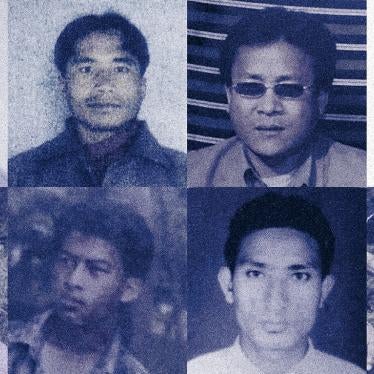Human Rights Watch called for urgent international attention to the escalating communal conflict in and around Ambon in Indonesia's Moluccan islands.
The conflict has claimed more than one hundred lives since January 19, when a market brawl escalated into pitched battles between Christians and Muslims. Both sides have burned houses and vehicles and used machetes, spears, knives, and arrows in their attacks on each other. Those traditional weapons caused most of the casualties in the first weeks of the fighting, but deaths in recent days were the result of military opening fire on armed crowds.
The violence in Ambon has major implications for communal relations in Indonesia more generally, Human Rights Watch warned. Some national Muslim political parties see Ambon as evidence of Islam under siege by a Christian minority resentful of its declining influence. Many Indonesian Christians, meanwhile, see it as evidence of their increasingly precarious position in a Muslim majority state. The polarization is likely to affect campaigning for the upcoming parliamentary elections scheduled for June, channeling political debate into communal issues.
"The hostility between the two communities is such that each side is reluctant to acknowledge that there are dead, displaced, and detained on the other. In fact, the toll has been terrible for both, and there is an urgent need for assistance for both," said Sidney Jones, Asia director of Human Rights Watch, who returned from Ambon last week.
Equally urgent, Jones said, is a security force perceived as neutral in the conflict and one that is equipped with non-lethal methods of crowd control. In the first weeks of the conflict, local police and army forces were criticized for failing to stop mobs on both sides from armed attacks or from dousing houses, markets, mosques, churches, and sometimes people with gasoline and setting them ablaze. Each side perceived the security forces' inaction as favoring the other. Now the army is firing on people, the death toll is mounting rapidly, and the same accusations of bias are being made.
There are also serious concerns about whether the soldiers are respecting basic principles on the use of lethal force, since they are using live bullets and appear to be unequipped to handle the kind of large-scale communal unrest they are facing.
Tensions between Muslims and Christians in Ambon have been building for years, but even in the past, Ambon was never the tranquil land of interreligious harmony that the Indonesian government has portrayed.
When Indonesia declared independence from the Dutch in 1945, many Christians in Ambon and surrounding islands identified more with the Netherlands than with the Indonesian nationalists. They mounted a short-lived separatist movement after independence called the Republic of the South Moluccas (RMS); several of the Muslim villages that have figured prominently in the recent conflict were razed by RMS forces in 1950, and the bitterness remains. In the recent fighting, Muslim leaders have accused the Christians of working with the RMS, thereby portraying them as both militarily organized and disloyal.
The influx into Ambon of devoutly Muslim migrants -- ethnic Bugis, Butonese, and Makassarese from the island of Sulawesi in particular -- also brought changes. These migrants now dominate local commerce and their arrival has tipped the demographic balance between Muslims and Christians in favor of the former.
A traditional alliance mechanism between Muslims and Christians, called "pela," had no relevance to the migrants, and low-level fighting between Christian and Muslim migrant communities was commonplace. While Christians traditionally dominated the local civil service and police, this began to change in the mid-1990s when a Muslim Ambonese was named governor and began to fill vacancies with Muslim appointees, causing both resentment and fear on the Christian side.
The situation grew perceptibly worse after incidents of church-burnings and attacks on mosques in Jakarta and West Timor in November. As Christmas and the Muslim fasting month approached in December, both communities in Ambon were on heightened alert for the possibility of communal provocation and developed communication networks to mobilize their people in case of trouble. When a fight broke out in mid-January between a Christian public transport driver and two Bugis youths, the networks went into action.
"Whether the Ambon violence was provoked, as many have speculated," said Jones, "the much more important question now is how to stop the violence and help the victims, and for that, international attention is crucial." Particularly important, she said, was for the international and national media to reflect information from both Muslim and Christian sources; for international pressure to help ensure non-lethal forms of crowd control; and for assistance from international humanitarian agencies with the tens of thousands of displaced people.






